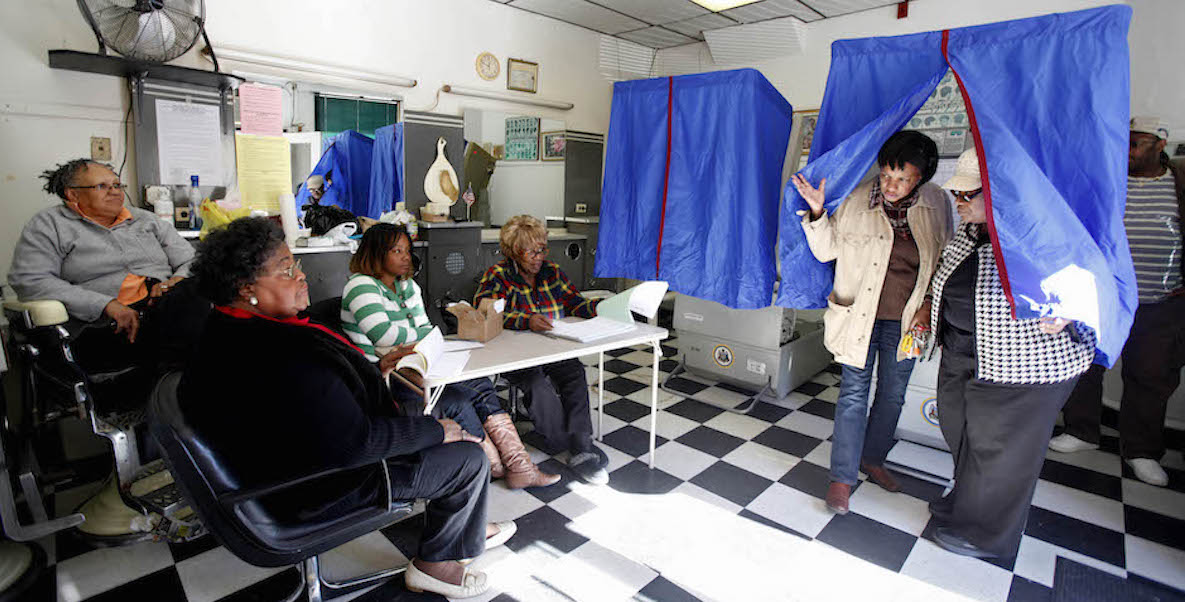This year’s ward elections doubled the number of Open Wards, writes Tom Beck at South Philly Review, which is the largest burst of progress for intra-Democratic Party democracy since the 60’s and 70’s.
In the wake of May’s citywide ward leader/committee post elections, several ward leaders in South Philly have announced the planned transformations of their wards into “open wards,” wards in which committee people vote on who the ward endorses in local elections. In closed wards, which are far more common in Philadelphia’s ward system, the ward leader makes the sole decision about who the ward endorses…
Prior to May’s elections, there were just five open wards in the city—all of them on the Democratic side. They were the 5th, 8th, 9th, 27th, and 30th wards. The 30th ward, which became an open ward in 1998, is the most recent to become an open ward. The other four became open wards at various points in the ’60s and ’70s. As a result, the city has only had five open wards since 1998.
According to Karen Bojar, an expert on Philadelphia’s ward system and author of Green Shoots of Democracy Within the Philadelphia Democratic Party, there are plans among ward leaders to add five more open wards to that list since the last election: the 1st, 2nd, 18th, 48th and 51st—all of them Democratic. There are currently no open wards on the Republican side in the city’s ward system, or plans to create any.
There are different variations of Open Wards, and the term can also often refer to wards that allow committee person votes on any changes to policies and procedures, that allow the public to attend meetings, or that publish minutes, or file campaign reports. We’re doing some work with a group of new ward leaders and committee people now to tighten up some of the basic principles of Open Wards, with the aim of winning more converts in other places.
We think an open process, and certainly the idea of committee people voting on endorsements and important ward business, is generally applicable everywhere, but not everybody agrees with this idea.
Carol Jenkins is the Democratic ward leader of the 27th ward, which is an open ward. However, she doesn’t think all the other wards should follow her ward’s model. She stressed her voters and committee people are highly educated, which isn’t always the case for voters in other wards.
“[Every] ward could not possibly act like the 27th ward because they don’t have the same type of voters,” she said. She believes that in certain cases it’s the ward leader alone who knows best. She cited the 39B ward, which is led by Matthew Myers, as an example…
“Saying that committee people are always able to make a good decision, I’m not sure that’s always the case, and I think it’s pretty idealistic to say that it is—especially in the city with the differences in the neighborhoods,” she explained. “In large wards, you open up spats and you never come to a consensus. You may never get a simple majority. You may never get a majority. If you’ve got 90 people trying to come to a decision on who to endorse and you’ve got 52 people on the ballot, it can’t be a long drawn out arduous process. Logistically it becomes very difficult to do.”
In the article, I am quoted calling this position “elitist,” and I want to elaborate some more on that. First, it’s important to point out that Carol Jenkins is an icon of this particular political tradition in Philadelphia, and has paved the way for a lot of the contemporary organizing for a more democratic Democratic Party. We have an honest disagreement about this issue though, which for me comes down to whether or not you think working class people can be entrusted with understanding and making strategic decisions about politics.
My position is that they can, and we should be aspirational about this, and try to develop people’s leadership by giving them real decision-making power and responsibilities.

While it’s true that not every committee person is going to have a complete 360-degree view of party politics, and may have been recruited to run without having a lot of preexisting knowledge, they should be able to gain some of that knowledge by participating in the ward.
![]()
Committee people get elected in May, and then the next opportunity to endorse candidates happens the spring of the following year. During that time, if the ward is doing its job, candidates will be coming in to make pitches, the ward will be sharing news about the campaigns, and the ward leader will be keeping people informed about important happenings in neighborhood or city politics. If all that is happening, committee people are going to be some of the most informed voters out there—easily in the top decile of voters.
That is plenty of information to be able to take an endorsement vote as part of the committee.
Ward leaders may be better informed or more savvy about politics, but if they really have that much better information, then they should be able to use that to persuade committee people of the wisdom of their preferred endorsements—particularly on judicial elections, to Jenkins’s point, when there are approximately one million people running.
People aren’t stupid. If they’ve been talking to their neighbors and have a sense of what matters to people in their neighborhood, they should be able to listen to a politician speak and answer questions, and come to a conclusion about who is best to represent their neighborhood.
![]()
It seems more likely that Closed Ward leaders’ real fear isn’t that committee people aren’t smart enough to make informed choices—but that they are. Maybe they’ll listen to the candidates, and come to the “wrong” conclusion about who is best—someone who might not be the incumbent office holder, or the person the Party thinks is rightfully next in line.
To learn more about who’s involved in your local ward and get in contact, check out the Philly Ward Leaders site. We’re working with a team of folks from Code for Philly and Committee of Seventy to keep that site updated with more data, links, and contact information for the city’s 66 wards. You can get involved with the project here.
Jon Geeting is the director of engagement at Philadelphia 3.0, a political action committee that supports efforts to reform and modernize City Hall. This is part of a series of articles running in both The Citizen and 3.0’s blog.
Photo Credits: Associated Press




